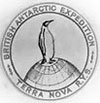Remembrance of places distant
December 4th, 2002
Kristan wanted to hike the Taylor Valley. They wouldn't let her do it unless someone who'd already done it once went with her.
Strange as it seems, that someone was me. And strange as it was to me, I remembered the way. When we came to blind corners, I remembered the decisions I made last year. I knew where it was going to be level, and where steep. The frozen puddles. The mummified seals.
Trudging through the alien landscape, I was the guide.
How is it I know my way though this place? This pernicious nothingness. This life. This ice.
The hike from Lake Bonney to Lake Hoare is about 12 miles. Hikers pass three glaciers. The final mile is over a blue-ice lake, so you need stabilicers to keep from slipping and bruising yourself.
We took four and a half hours. We really cruised.
"Stan" took a lot of pictures. She's doing a series on the dry valleys for her newspaper back home. Even with stopping for five minutes every so many hundred yards, we still got to Lake Hoare fast. That meant climbing a number of moraines. Fording frozen glacier moats. Climbing rocks. Slogging up hundred-foot high sand dunes that feel temperatures as cold as dry ice in the winter. Winds as strong as Hurricane Andrew.
We took a break next to a mummified seal, now dead some couple thousand years, its body preserved by the arid cold air.
I munched a Cadbury Energy bar. Stan ate the leftover Antarctic Cod from our Thanksgiving dinner.
"We're pretty lucky," one of us said. It doesn't matter which.
The other said something as profound as, "Yeah," and that was it. The number of people who have walked that path are well recorded, starting 99 or so years ago with Scott's men during the voyage of the Discovery. Unlike most places, the ever-omniscient "they" know everyone who's walked between the lakes.
It is that fact we considered when we pondered our fortune. The Seuss glacer before us. The Ferrar to our back. The warm katabatic winds swirling around us.
An hour later we passed through the defile, a thin passageway between the Seuss and a mountain wide enough for humans to pass. After many pictures we made it to Lake Chad, so named because the first explorers, upon sampling the water, discovered through intestinal distress the lake contained a natural magnesium laxative, and so named it after the toilet tissue they'd brought.
Without sampling the water we donned our ice spikes, called stabilicers. These are like the flip-flop-style sandels one wears at the beach with flathead screws turned into the bottom. You strap them to your hiking boots with velcro flaps, and then you walk on the screwheads which give you traction on the glare ice.
After an hour walking on blue ice Stan felt looked like a frozen swimming pool, we reached the Lake Hoare hut.
Inside, one of the mechanics was working on the camp solar system (for electric power). His name is the same as mine, and when a call came in on the camp radio they needed someone with our name at the dive hut on the lake, he asked me to cover. After all, wasn't one of us as good as the other?
I thought not. He was the one with the tools.
He pled for about 30 seconds. I relented.
I loaded up his tools and one of the limnologists came by on the Polaris ATV. She drove me 2 miles across the frozen lake to a place where they'd sunk a 3' diameter hole in the ice down to the lake water.
The diver was standing in his dry suit. The wires to his communications helmet had come off.
I want to say I went to work quickly, but the truth is, the I first had to stab myself in the finger with a sharp, brand new leatherman tool. Some tape had to be cut off the dive hose to release the communication wires and the tech there was too afraid to cut the hose to do it herself.
As a man without a job or insurance, I carefully removed the tape sacrificing my finger instead of piercing the expensive pressure hose.
Under any other conditions, this would not be an issue. In the dry valleys, where any human contamination is a violation of international law, it was an environmental crime.
Thank god for electrical tape. "Stan" (who was there to photograph the dive operations) wrapped my finger in black tape and I quickly repaired the wire, becoming an Antarctic hero for about four seconds.
I drove away on the ATV feeling I'd done something good for the Antarctic program, sustaining injury for the greater good of science.
Back in the hut I learned I had to now classify the electrical tape a biomedical hazard, and tossed it in the appropriate bin locked with massive structures capable of retaining cancer cells and Ebola virii.
But the divers were diving, and the hike was had, and all was well at Lake Hoare camp.
As I settled in to a dinner of conversation, Thai curry, and Tang I pondered my fortune and decided that life, in general, was well worth living, and that the strange turn mine had taken made mine all the more worth having.
No matter what happens on this earth, in my life, from now on, I have been with these people and done these things.
I will remember.
